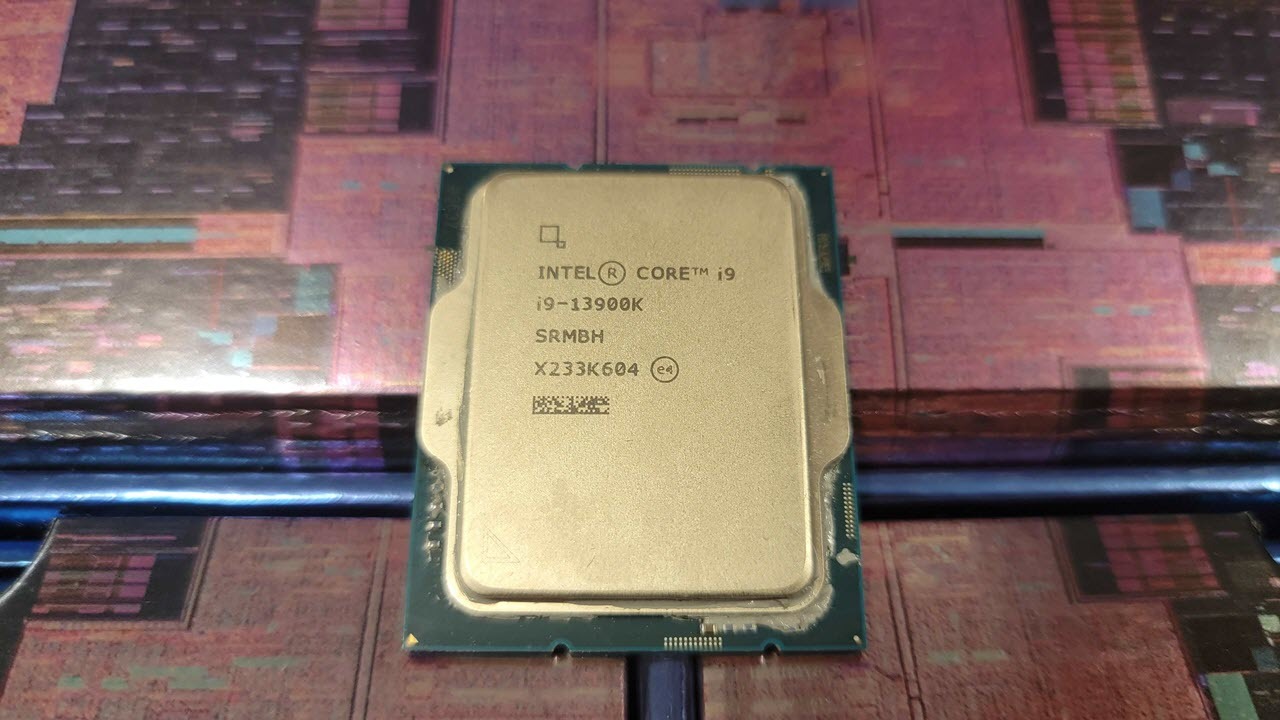Why you can trust Tom's Hardware
Power Consumption and Efficiency Core i9-13900K and Core i5-13600K

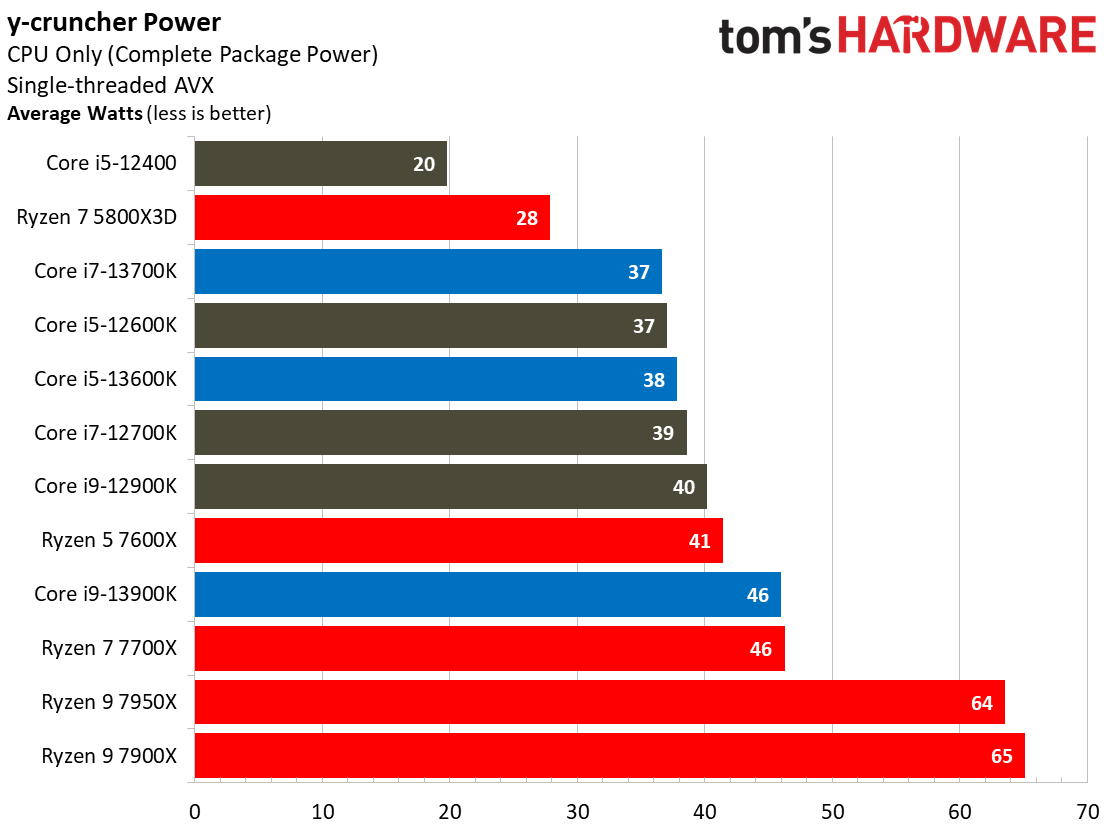
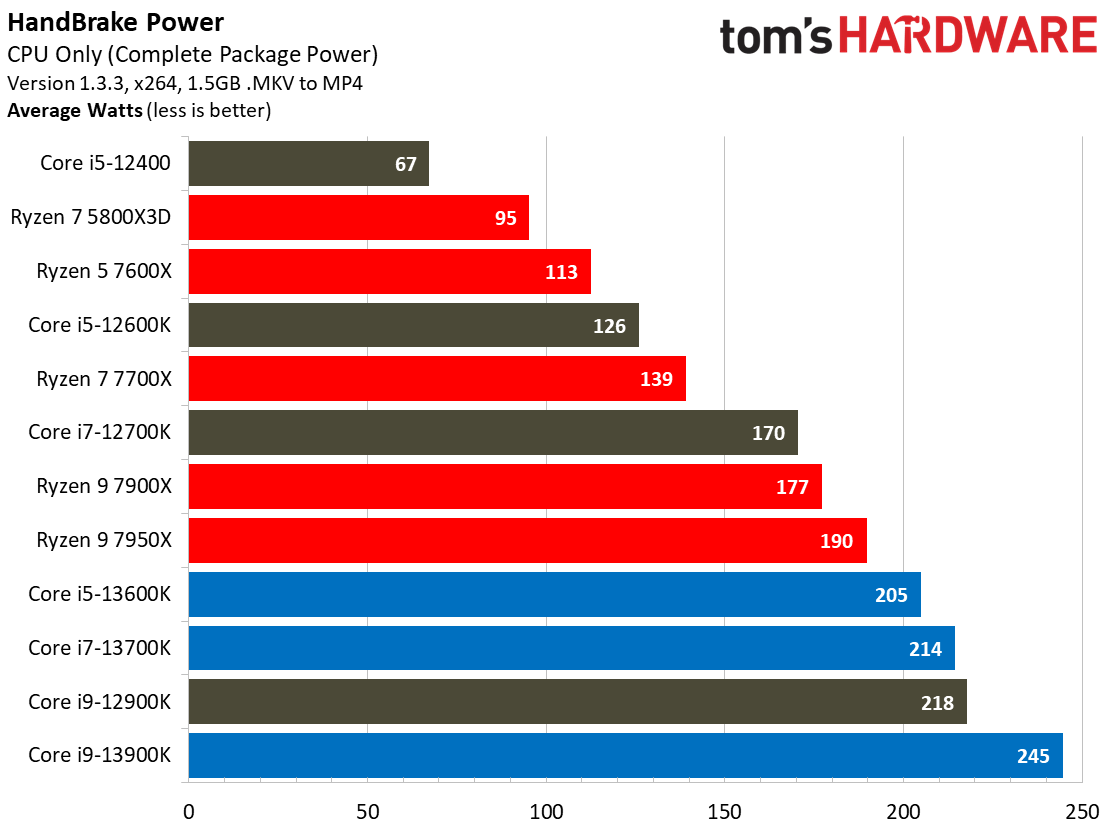
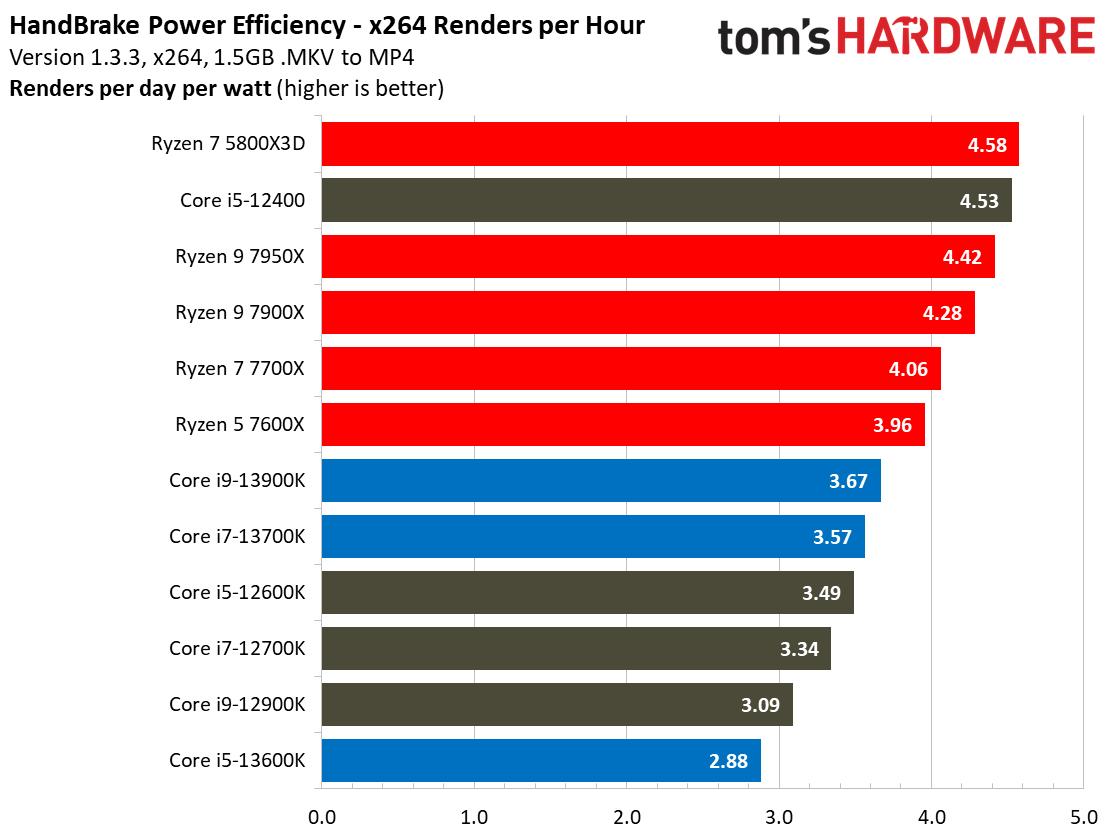
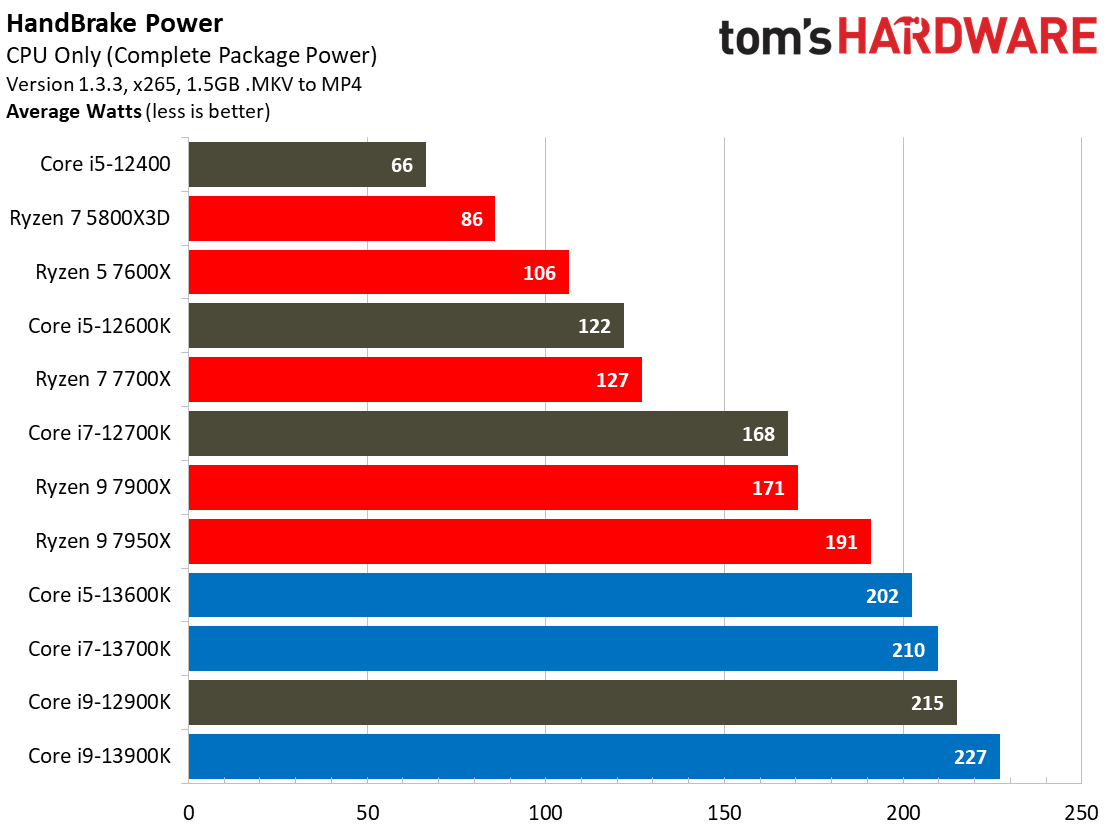
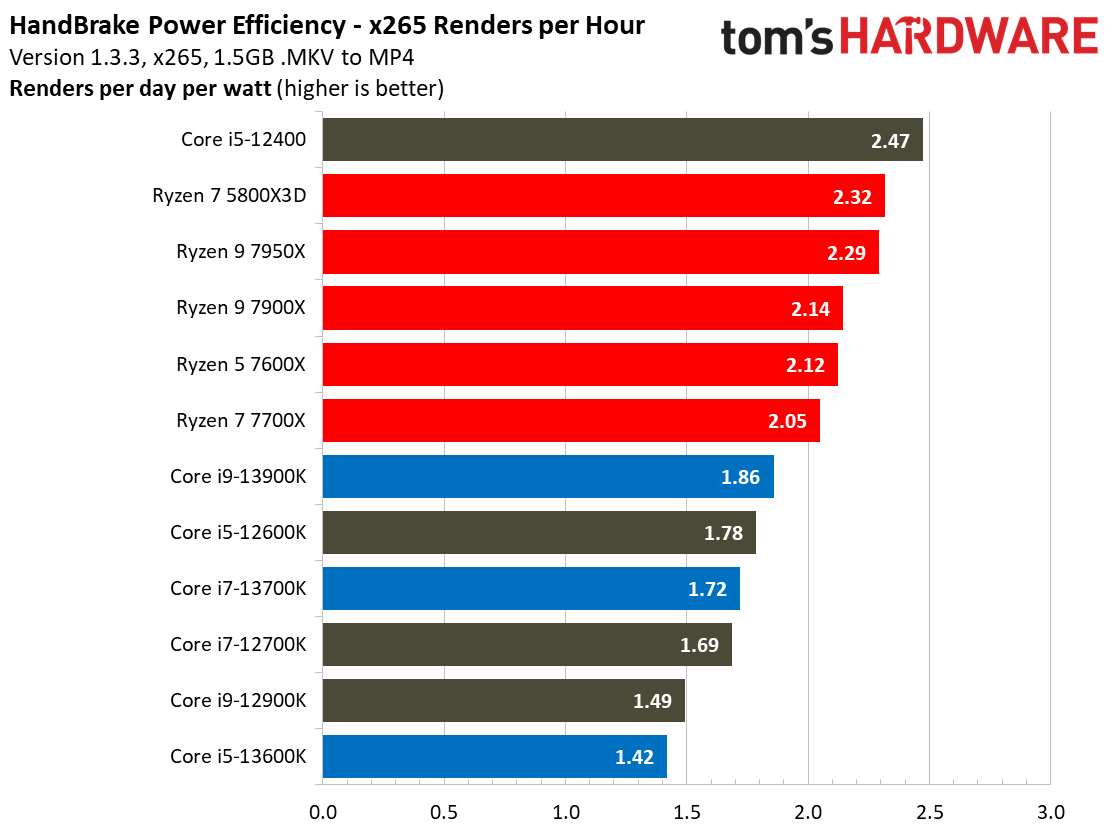
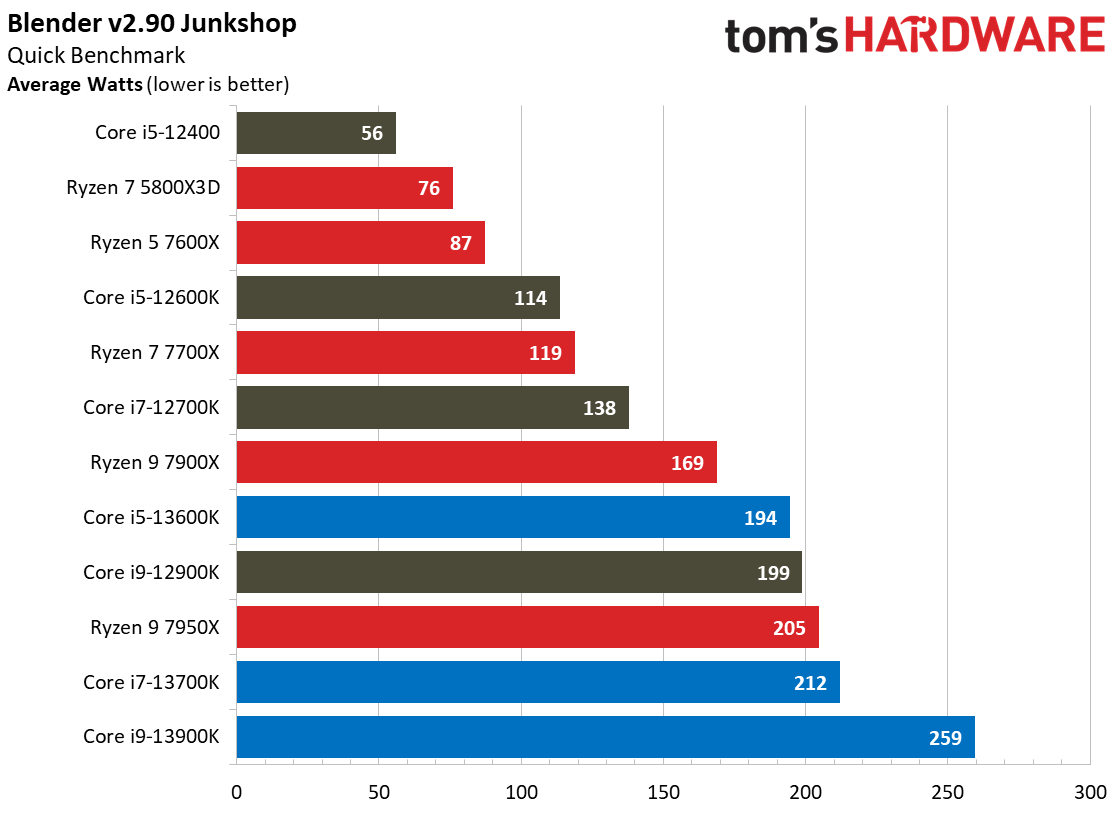
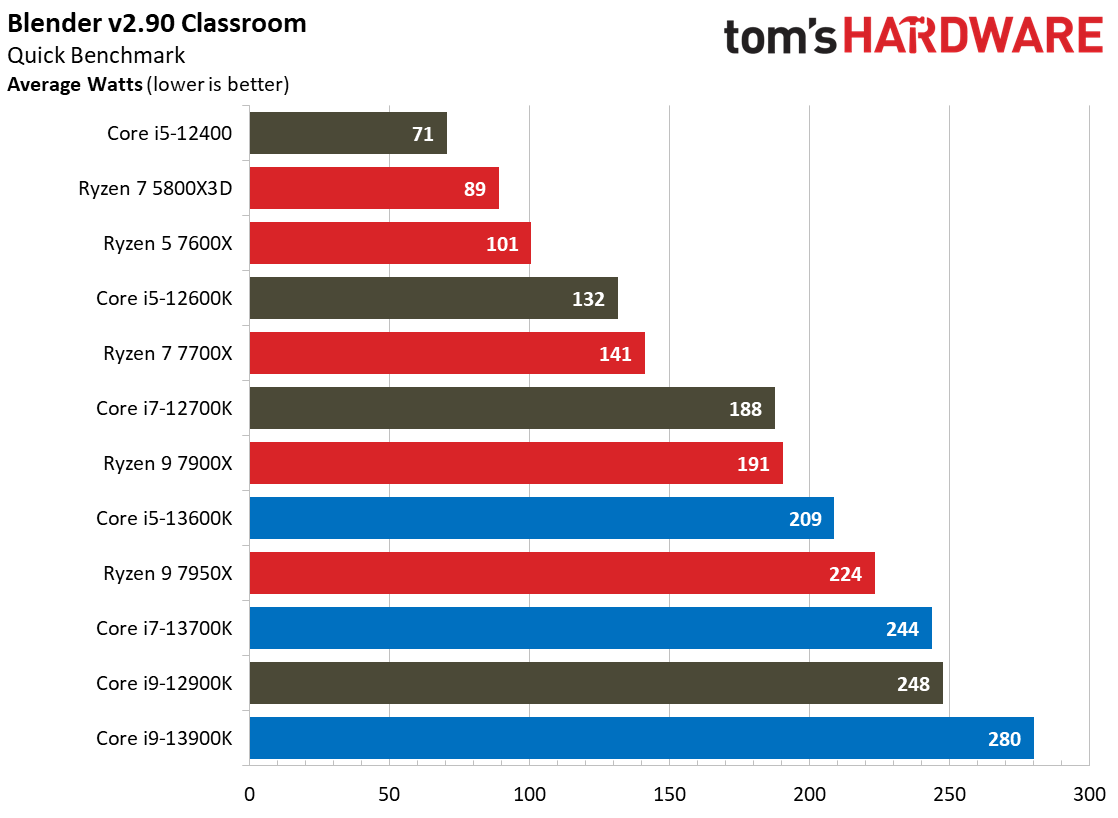
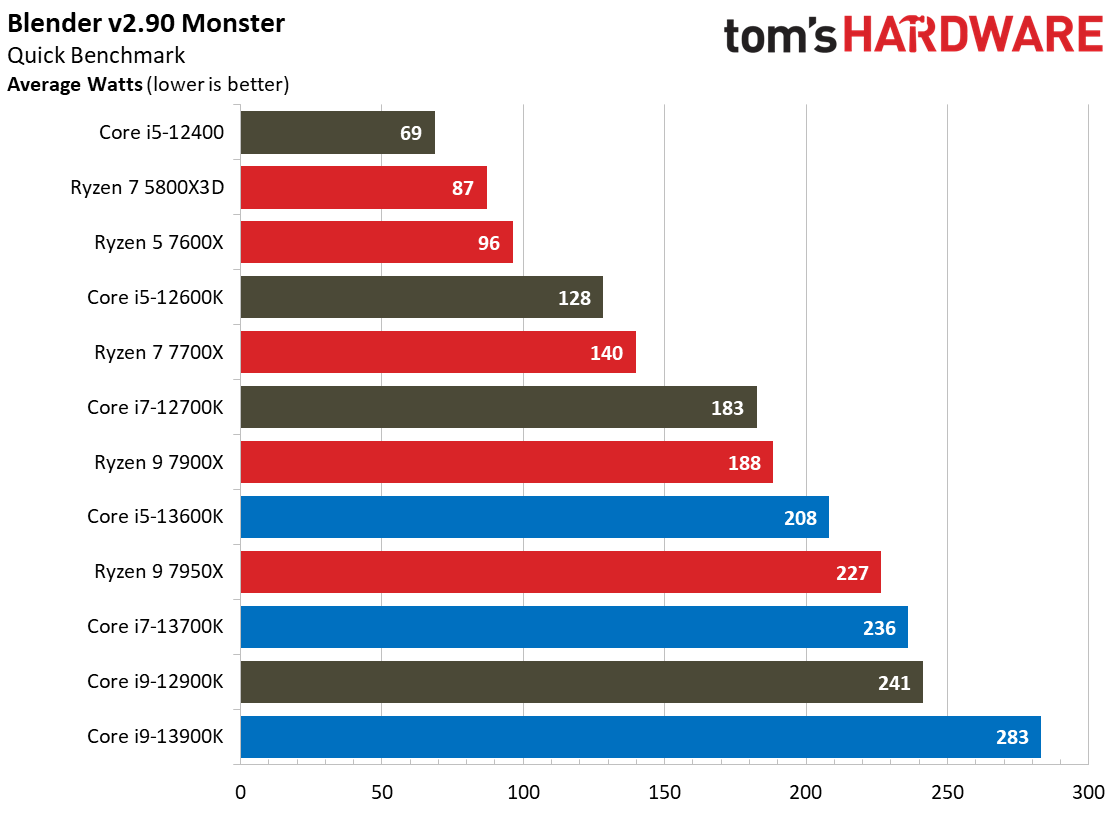
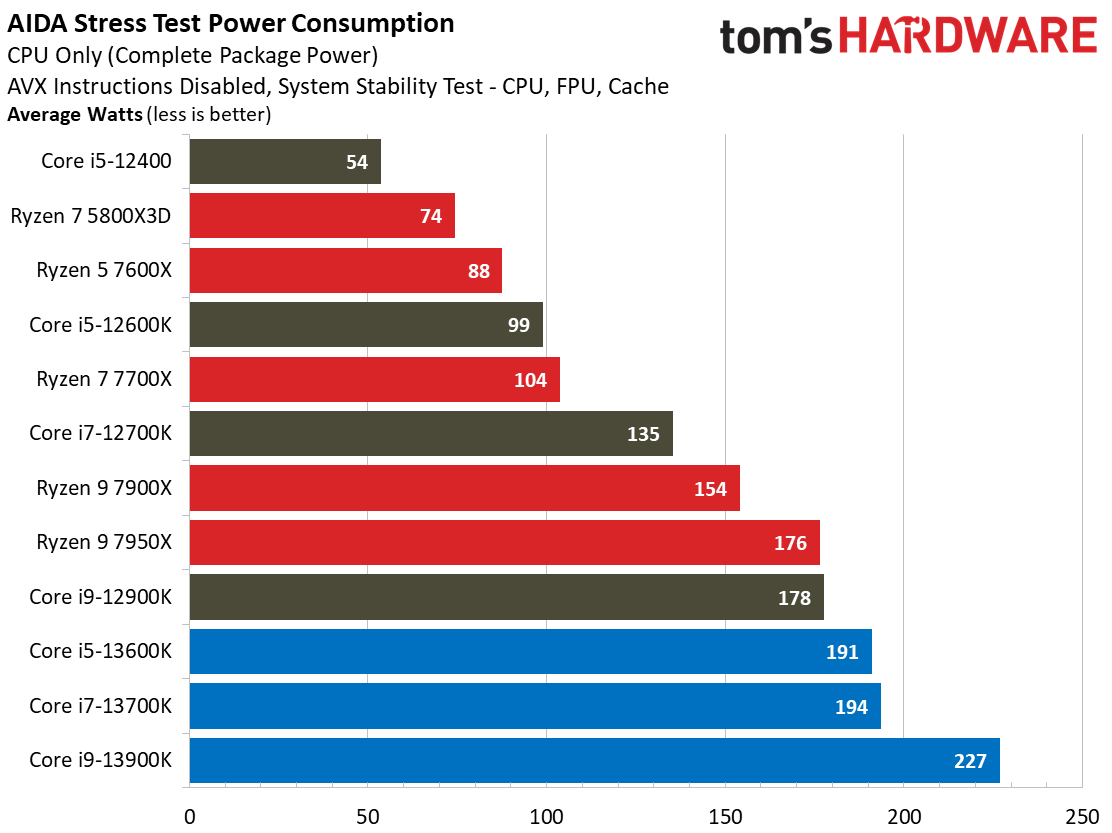
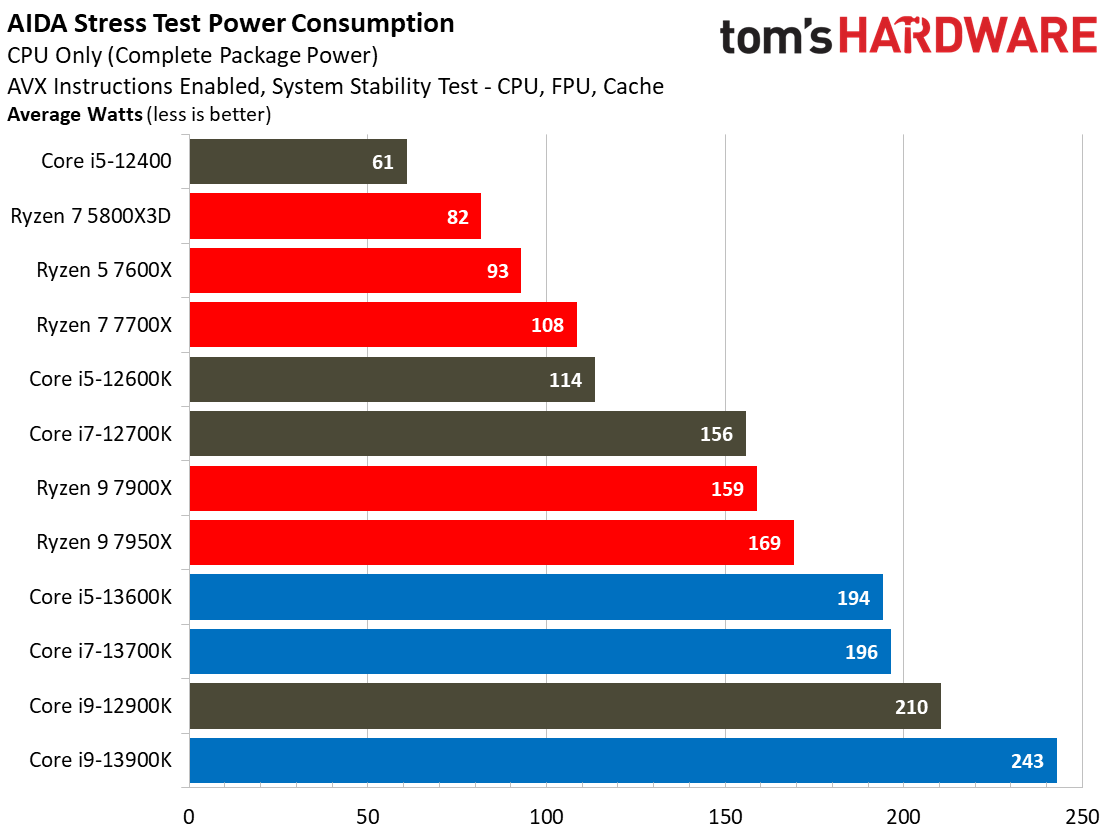
Both chipmakers are dialing up power as they grapple for the lead, but AMD has the advantage of the denser 5nm TSMC node. Despite Ryzen 7000’s substantial gen-on-gen increase in power consumption, Intel’s Raptor Lake processors still consume more power. However, they also deliver more performance in some types of work.
The renders-per-day-per-watt charts show that the Core i9-13900K is more efficient than the previous-gen Core i9-12900K, while the Core i5-13600K's increased power consumption and tuning for the higher end of the V/F curve has led to a generational decline in efficiency.
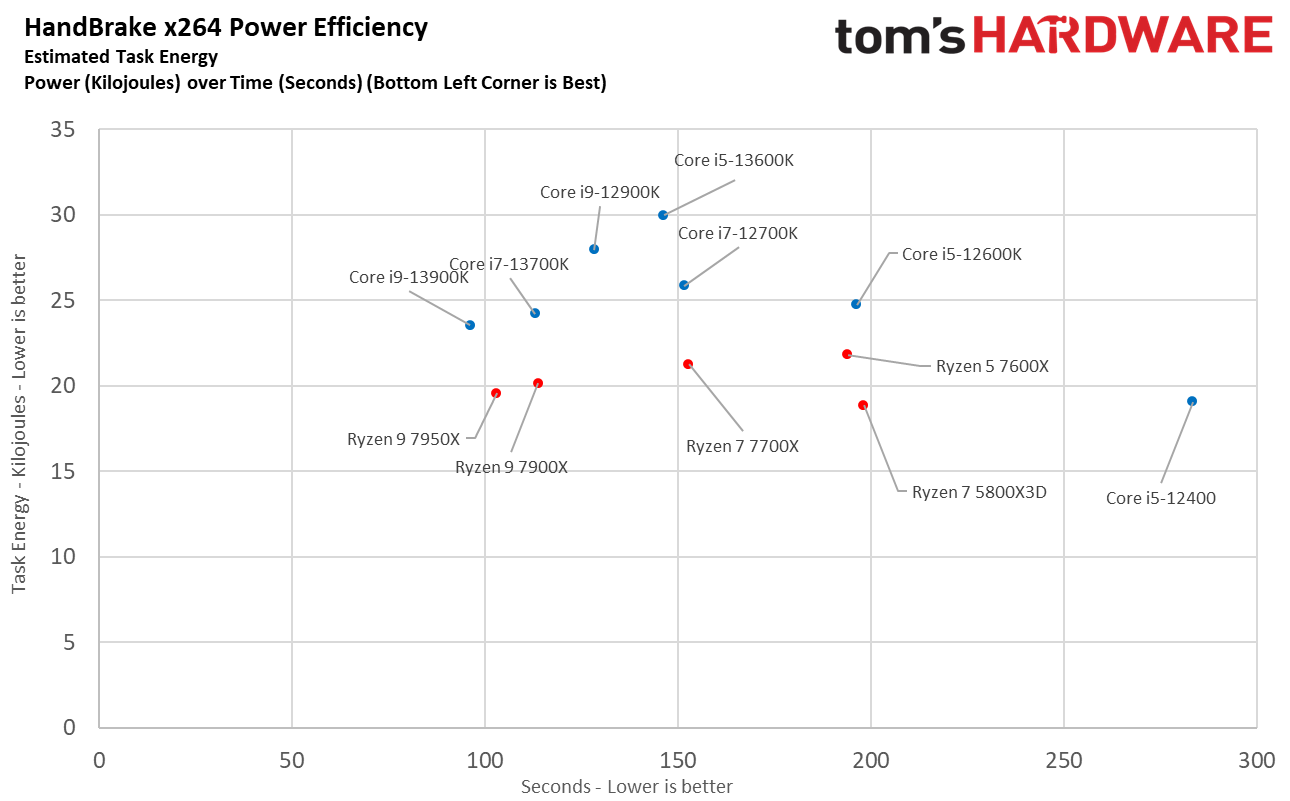
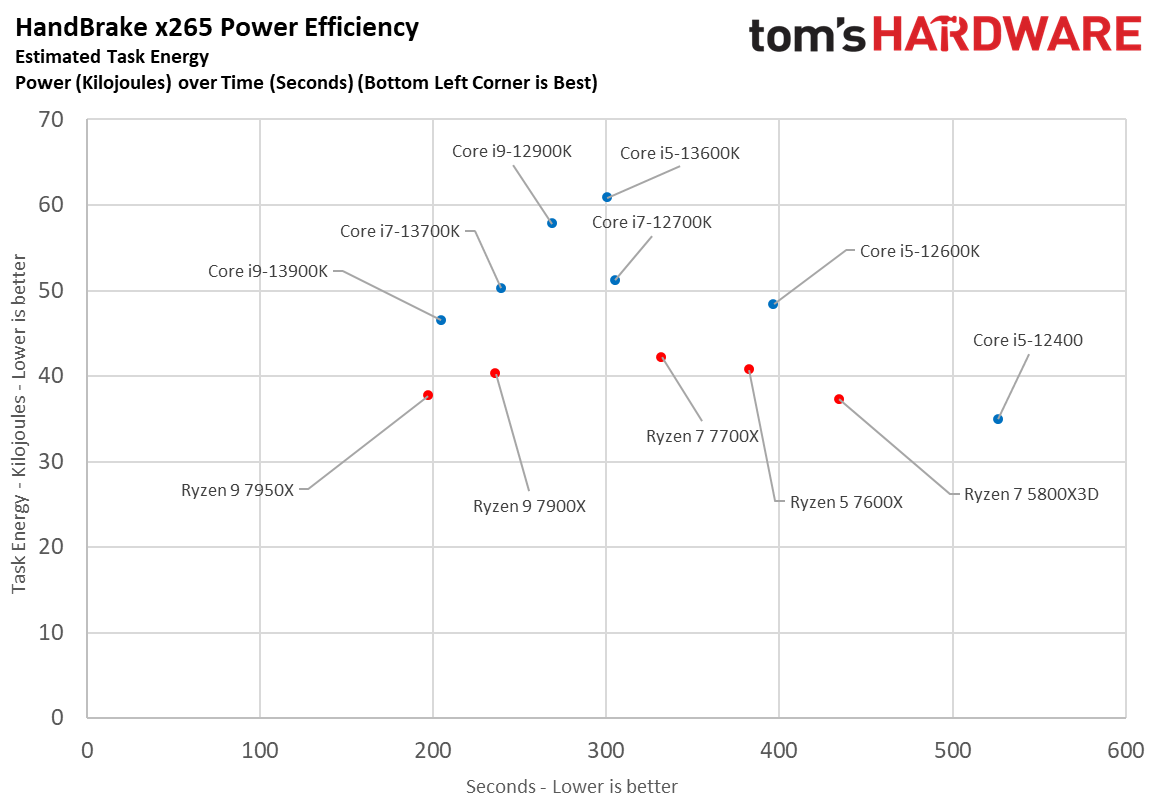
Here we take a slightly different look at power consumption by calculating the cumulative energy required to perform x264 and x265 HandBrake workloads, respectively. We plot this 'task energy' value in Kilojoules on the left side of the chart.
These workloads are comprised of a fixed amount of work, so we can plot the task energy against the time required to finish the job (bottom axis), thus generating a really useful power chart.
Remember that faster compute times, and lower task energy requirements, are ideal. That means processors that fall the closest to the bottom left corner of the chart are the best. Here we can see that the Core i9-13900K isn't as efficient as the Ryzen 9 7950X, but it does make a marked improvement over the previous-gen 12900K. In contrast, the 13600K is faster than the 12600K, but it takes much more power to get there.
- MORE: AMD vs Intel
- MORE: Zen 4 Ryzen 7000 All We Know
- MORE: Raptor Lake All We Know
Get Tom's Hardware's best news and in-depth reviews, straight to your inbox.
Current page: Power Consumption and Efficiency Core i9-13900K and Core i5-13600K
Prev Page Intel Core i9-13900K and Core i5-13600K Heat, Overclocking, Benchmark Test Setup Next Page Gaming Benchmarks Intel Core i9-13900K and Core i5-13600K
Paul Alcorn is the Editor-in-Chief for Tom's Hardware US. He also writes news and reviews on CPUs, storage, and enterprise hardware.
-
Maebius Great review peeps.Reply
Curious, will you test Raptor Lake with DDR4?
Also, aren't new-gen motherboard prices (for both AMD and Intel), kinda uhm, on the expensive side, even for entry level? -
johnnyboy5520 The Raptor Lake 13900K and AMD 7950X are pretty much equivalent. As for gaming, the 7000 X3d chips will bury Raptor Lake. AMDs mistake was keeping the same core count on the lower end SKUs which allowed Intel an easy win in productivity. Gaming is pretty much game dependent. I don't think AMD will make that same mistake going forward. They've got the superior architecture.Reply -
Why_Me Reply
The B760 boards and locked Intel cpu's are due for release this January.Maebius said:Great review peeps.
Curious, will you test Raptor Lake with DDR4?
Also, aren't new-gen motherboard prices (for both AMD and Intel), kinda uhm, on the expensive side, even for entry level? -
TerryLaze Reply
It wasn't a mistake from AMD, it was all they could do.johnnyboy5520 said:The Raptor Lake 13900K and AMD 7950X are pretty much equivalent. As for gaming, the 7000 X3d chips will bury Raptor Lake. AMDs mistake was keeping the same core count on the lower end SKUs which allowed Intel an easy win in productivity. Gaming is pretty much game dependent. I don't think AMD will make that same mistake going forward. They've got the superior architecture.
There are only so many combinations of their CCX they can do.
To increase their core counts on the lower CPUs they would have to add an CCX to them and come up with a way to add a third CCX to their 7950x.
That would mean that they would lose a big chunk of their margins or increase their prices by that amount, both of these options would be very bad for AMD.
If TSMC comes up with a good node shrink then AMD can increase the amount of cores per CCX for the next round, but then again the amount of cores is already ridiculous and only appeals to a very small amount of people. -
PCWarrior Reply
Not sure how you can claim that AMD has the superior architecture. All the IPC tests show that Raptor Cove P-Cores are ahead of Zen 4 in IPC. Also Intel’s hybrid approach is proving highly effective when it comes to heavily multithreaded workloads. The only thing that AMD has an advantage over Intel is in efficiency but that is only thanks to TSMC N5 (which is a full node ahead of Intel 7) and not due to some AMD microarchitectural design advantage. If anything, the very fact that Intel offers the same or superior performance despite being a full node behind is due to having a better architecture. Much like Nvidia’s RTX 3060 (on Samsung 8nm, an equivalent to a TSMC '10nm') versus Intel’s A770 (on TSMC 6nm).johnnyboy5520 said:The Raptor Lake 13900K and AMD 7950X are pretty much equivalent. As for gaming, the 7000 X3d chips will bury Raptor Lake. AMDs mistake was keeping the same core count on the lower end SKUs which allowed Intel an easy win in productivity. Gaming is pretty much game dependent. I don't think AMD will make that same mistake going forward. They've got the superior architecture. -
The Historical Fidelity Intel artificially hiding L2 cache on the alderlake chips is pretty sus to me. Another reason I am done with Intel. Anti-consumer behavior all day.Reply -
The Historical Fidelity Reply
You are absolutely wrong about efficiency, Zen is a much more power and area efficient architecture. Except for when they decide to go for the highest clock speeds possible on the process node they manufacture on. TSMC’s node designs are notoriously voltage hungry on the top of their operating speeds. Bring down the top speed by 2-300 MHz and the zen 4 7950x sips power at a 105 watt TDP (AMD ECO mode) similar to zen 3 power.PCWarrior said:Not sure how you can claim that AMD has the superior architecture. All the IPC tests show that Raptor Cove P-Cores are ahead of Zen 4 in IPC. Also Intel’s hybrid approach is proving highly effective when it comes to heavily multithreaded workloads. The only thing that AMD has an advantage over Intel is in efficiency but that is only thanks to TSMC N5 (which is a full node ahead of Intel 7) and not due to some AMD microarchitectural design advantage. If anything, the very fact that Intel offers the same or superior performance despite being a full node behind is due to having a better architecture. Much like Nvidia’s RTX 3060 (on Samsung 8nm, an equivalent to a TSMC '10nm') versus Intel’s A770 (on TSMC 6nm). -
TerryLaze Reply
On average the 7950x is about 3% faster in multi, (loses hard on single) and uses 20W less power.The Historical Fidelity said:You are absolutely wrong about efficiency, Zen is a much more power and area efficient architecture. Except for when they decide to go for the highest clock speeds possible on the process node they manufacture on. TSMC’s node designs are notoriously voltage hungry on the top of their operating speeds. Bring down the top speed by 2-300 MHz and the zen 4 7950x sips power at a 105 watt TDP (AMD ECO mode) similar to zen 3 power.
It is more efficient, but much more is hugely hyperbolic, it's so little most people won't even bother to call it a difference.
And you can reduce power draw on the 13900k as well and you only lose performance in a very few applications.You know which ones because all the "trusted reviewers" use exclusively those apps and nothing more.
https://www.pcwelt.de/article/1357334/core-i9-13900k-core-i5-13600k-im-test.html -
The Historical Fidelity ReplyTerryLaze said:On average the 7950x is about 3% faster in multi, (loses hard on single) and uses 20W less power.
It is more efficient, but much more is hugely hyperbolic, it's so little most people won't even bother to call it a difference.
And you can reduce power draw on the 13900k as well and you only lose performance in a very few applications.You know which ones because all the "trusted reviewers" use exclusively those apps and nothing more.
https://www.pcwelt.de/article/1357334/core-i9-13900k-core-i5-13600k-im-test.html
That is actually still very high power usage even with MCE off and PL1/2 adherence.
In a thorough review (reference below) of power efficiency we see:
the 7950x at 142 watts beating the 13900k at 142 watts by 13.4% on the combined productivity benching suite graph,
the 7950x at 88 watts beating the 13900k at 88 watts by 14.3% on the combined productivity benching suite graph,
and the 7950x at 65 watts beating the 13900k at 65 watts by 11.7% on the combined productivity benching suite graph.
That’s an average 13.13% better performance efficiency at the same power levels for the 7950x compared to 13900k. That’s a big difference to say the least.
https://tekdeeps.com/energy-efficiency-ryzen-9-7950x-40-over-core-i9-13900k-even-after-tdp-limitation/
